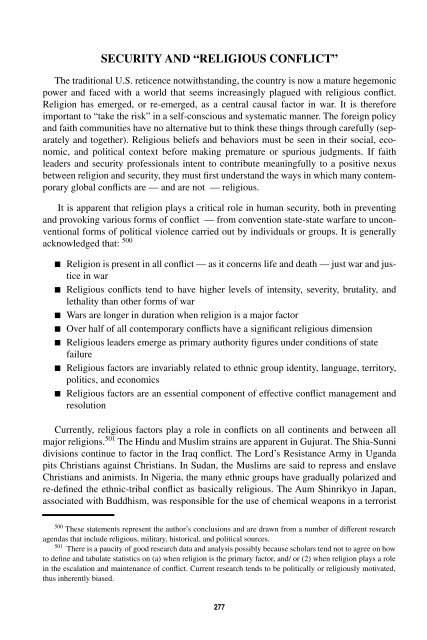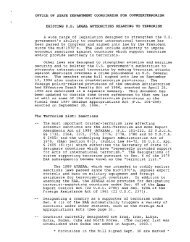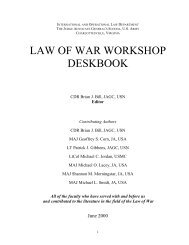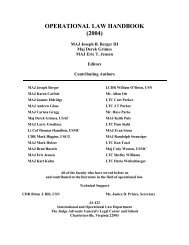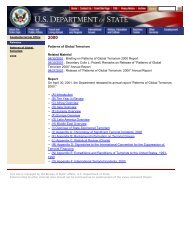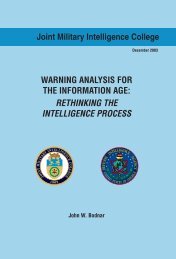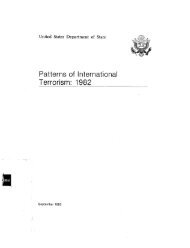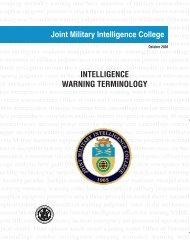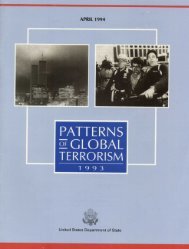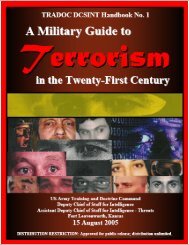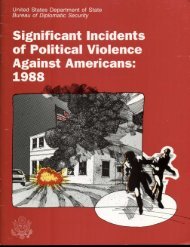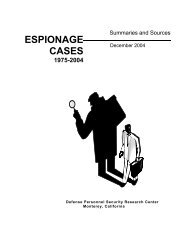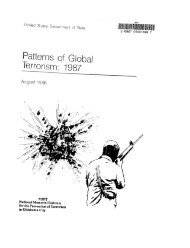- Page 1 and 2:
Joint Military Intelligence College
- Page 3 and 4:
The Joint Military Intelligence Col
- Page 5 and 6:
The History of Intelligence The San
- Page 7 and 8:
THE WORK OF INTELLIGENCE
- Page 9 and 10:
carefully considered positions on t
- Page 11 and 12:
ies out a significant part of Sherm
- Page 13 and 14:
To illustrate the fulfillment of Ke
- Page 15 and 16:
have I taken any example out of con
- Page 17 and 18:
Effective only for producers on a f
- Page 19 and 20:
“. . . the month of February . .
- Page 21 and 22:
paper — preferably a disintereste
- Page 23 and 24:
sentences — like a supercomma or
- Page 25 and 26:
Completeness The flip side of the c
- Page 27 and 28:
about the subject — that your pap
- Page 29 and 30:
gence. But the use of intelligence
- Page 31 and 32:
international conference highlighte
- Page 33 and 34:
PART I INTELLIGENCE PROCESS [I]ntel
- Page 35 and 36:
intelligence products may be descri
- Page 37 and 38:
Human Source Intelligence (HUMINT)
- Page 39 and 40:
Table 2. Illustrative Definitions o
- Page 41 and 42:
As with the “Five Ws,” this mod
- Page 43 and 44:
Types of Intelligence Requirements
- Page 45 and 46:
Table 6. Intelligence Values Source
- Page 47 and 48:
■ Thirdly, the skilled analyst mu
- Page 49 and 50:
ely on only one source, because no
- Page 51 and 52:
needed, but it is up to the individ
- Page 53 and 54:
GETTING INTELLIGENCE RIGHT: THE POW
- Page 55 and 56:
ner, process improvement initiative
- Page 57 and 58:
FUNDAMENTAL PRINCIPLES OF INTELLIGE
- Page 59 and 60:
product is shaped, analysts and man
- Page 61 and 62:
from an inductive reasoning process
- Page 63 and 64:
Information assimilation, the fitti
- Page 65 and 66:
Man is not rational, merely capable
- Page 67 and 68:
Documentation also helps minimize b
- Page 69 and 70:
Politicization. The Principle of Ob
- Page 71 and 72:
Classic errors in format include th
- Page 73 and 74:
Pitfalls that Limit Relevance Proce
- Page 75 and 76:
To the dismay of their customers, m
- Page 77 and 78:
motion picture analogy, time serves
- Page 79 and 80:
is extensible, universally open to
- Page 81 and 82:
Figure 5. Relating Process to Princ
- Page 83 and 84:
OPENING WINDOWS OF OPPORTUNITY: THE
- Page 85 and 86:
today’s strategic warning network
- Page 87 and 88:
with their perceptions of basic dem
- Page 89 and 90:
eliminate a threat or exploit an op
- Page 91 and 92:
Opportunity-based warning is vulner
- Page 93 and 94:
Except for varying opinions among p
- Page 95 and 96:
The style of traditional Western ed
- Page 97 and 98:
Figure 10. The NPIC Update. Source:
- Page 99 and 100:
ut that “the drawing teacher has
- Page 101 and 102:
Only the best tools can support a c
- Page 103 and 104:
Figure 13. Harmon’s Version of a
- Page 105 and 106:
After explaining the lesson behind
- Page 107 and 108:
Figure 17. Pattern. Source: Kennedy
- Page 109 and 110:
First Lieutenant Matthew S. Weingas
- Page 111 and 112:
amount, 203 but psychologists have
- Page 113 and 114:
When gifted seers depart the Colleg
- Page 115 and 116:
SPY FICTION, SPY REALITY 211 Jon A.
- Page 117 and 118:
Examples of this practice are fairl
- Page 119 and 120:
gence officer. W. E. B. Griffins mu
- Page 121 and 122:
you feel the appeal of the Resistan
- Page 123 and 124:
Short, fat and of a quiet dispositi
- Page 125 and 126:
assassinate Castro; the list includ
- Page 127 and 128:
A number of interviews touched on a
- Page 129 and 130:
and persuasive arguments you constr
- Page 131 and 132:
and necessary in any discovery-rela
- Page 133 and 134:
… it is rather more difficult for
- Page 135 and 136:
I will, however, note one crucial p
- Page 137 and 138:
drawn from Western history that soc
- Page 139 and 140:
trained. Admittedly, we did not kno
- Page 141 and 142:
HOMELAND SECURITY AND INTELLIGENCE:
- Page 143 and 144:
Finally, we must ask how all this c
- Page 145 and 146:
turbulent aftermath produced a lot
- Page 147 and 148:
occurs is in the eyes of the behold
- Page 149 and 150:
gence, it was evident that the cult
- Page 151 and 152:
national intelligence estimates, re
- Page 153 and 154:
The military is in a support role o
- Page 155 and 156:
Committee on Governmental Affairs i
- Page 157 and 158:
LEGAL FRAMEWORK AND POLITICAL/MILIT
- Page 159 and 160:
cause and to their computer and lib
- Page 161 and 162:
(1) Make membership of the House an
- Page 163 and 164:
which the nation was founded, such
- Page 165 and 166:
THE SAN CRISTOBAL TRAPEZOID By A. D
- Page 167 and 168:
The entire intelligence-operations
- Page 169 and 170:
Soviet leader’s responses through
- Page 171 and 172:
SHIFT IN RESPONSIBILITY The Preside
- Page 173 and 174:
The SS-5 IRBM, by contrast, had a r
- Page 175 and 176:
vide the President and his advisers
- Page 177 and 178:
A BAD DAY On 27 October, an Air For
- Page 179 and 180:
proposed in your second letter whic
- Page 181 and 182:
much to the security of the U.S. as
- Page 183 and 184:
selected from among the best availa
- Page 185 and 186:
EXPANDING THE HORIZON: THE ORIGINS
- Page 187 and 188:
lis that it could not be relied upo
- Page 189 and 190:
lot” of information not only abou
- Page 191 and 192:
dent.” 353 On the same occasion,
- Page 193 and 194:
sively for Israel’s use was prefe
- Page 195 and 196:
ferent conclusions regarding the sa
- Page 197 and 198:
Human sources require special handl
- Page 199 and 200:
Getting the Case Released Except fo
- Page 201 and 202:
This is particularly true when the
- Page 203 and 204:
At this time there were 258 America
- Page 205 and 206:
A Tradition of Tribal Violence Conf
- Page 207 and 208:
Thursday, 7 April In his 0700 hours
- Page 209 and 210:
they relied on occasion on a battal
- Page 211 and 212:
The last convoy, led by Ambassador
- Page 213 and 214:
TEACHING NOTE FOR USE WITH THIS CAS
- Page 215 and 216:
THE CREATION OF THE NATIONAL IMAGER
- Page 217 and 218:
highlights the role of the House an
- Page 219 and 220:
The idea for such an agency seems t
- Page 221 and 222: deeply the SSCI was immersed in it.
- Page 223 and 224: sity of the guerilla warfare aimed
- Page 225 and 226: able, for the most part, to both th
- Page 227 and 228: Within the NFIP, the situation for
- Page 229 and 230: At this point, a NIMA Director-Desi
- Page 231 and 232: tions and a requirement for periodi
- Page 233 and 234: gorilla’’ on Capitol Hill. The
- Page 235 and 236: esolved the issue of jurisdiction o
- Page 237 and 238: tive branches, allowing a secret pa
- Page 239 and 240: SASC conference committee over the
- Page 241 and 242: every area. 484 The commission’s
- Page 243 and 244: HEALTH AND NATIONAL SECURITY George
- Page 245 and 246: ecognizable external military threa
- Page 247 and 248: A LIKELY DEMOCRATIC HEALTH SECURITY
- Page 249 and 250: High Commissioner for Refugees (UNH
- Page 251 and 252: Figure 24. Estimated Number of Peop
- Page 253 and 254: military and the UNHCR. This study
- Page 255 and 256: likely to occur (Boutros-Ghali a: 4
- Page 257 and 258: Strategic warning is an intelligenc
- Page 259 and 260: Early notification allows the opera
- Page 261 and 262: INTELLIGENCE SUPPORT TO PLANNING AN
- Page 263 and 264: Principal sources of information ar
- Page 265 and 266: While human intelligence is ideally
- Page 267 and 268: 5) Unclassified intelligence produc
- Page 269 and 270: hegemonic power fighting various gr
- Page 271: the U.S. government have personal a
- Page 275 and 276: Religion has effectively filled a v
- Page 277 and 278: who would contend that the current
- Page 279 and 280: The relevance of this discussion is
- Page 281 and 282: classified and is subject to strict
- Page 283 and 284: The RAC and its decentralized Insti
- Page 285 and 286: Although researchers at Asilomar we
- Page 287 and 288: The published report was the subjec
- Page 289 and 290: ■ Fourth, university faculties ha
- Page 291 and 292: esearch community a free pass, maki
- Page 293 and 294: In response to the recommendations
- Page 295 and 296: “SALSA FOR CYBER SONICS,” EDUCA
- Page 297 and 298: “OSINT?” the cyber sonic asks.
- Page 299 and 300: As we meet today, the College’s a
- Page 301 and 302: INTELLIGENCE: AN ECONOMIC GOOD Mark
- Page 303 and 304: less, Congress “artificially” l
- Page 305 and 306: ■ Synergistic Value. Synergy mean
- Page 307 and 308: Granted, because of the subjectivit
- Page 309 and 310: impact the calculation of time, in
- Page 311 and 312: so that an optimal strategy can be
- Page 313 and 314: cally areas which lack significant,
- Page 315 and 316: notably heroin and marijuana, to Am
- Page 317 and 318: ment model every administration has
- Page 319 and 320: IT ISN’T THE ACQUISITION, BUT THE
- Page 321 and 322: Just as military analysts seek enem
- Page 323 and 324:
ing Intelligence by Principles of Q
- Page 325 and 326:
■ Colonel Thomas W. Shreeve, Unit
- Page 327 and 328:
More information can be found at ht


